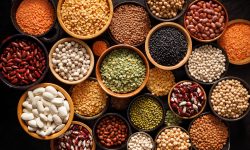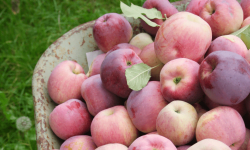Donating 10,000 meals in Pulses! For #WorldPulsesDay Spud is donating 10,000 meals worth with pulses…
Let’s talk about our health, shall we? More specifically, natural food. We turn to food labels to help us make better eating decisions and hope that certain words carry some clout, but surprisingly, “natural” isn’t one of them.
At Spud, we are extra vigilant about the foods we carry. So much so that we have our own banned ingredient list to help our valued customers avoid potentially harmful ingredients. But, “natural” isn’t an ingredient, rather a term used to imply that a product is healthy. Don’t feel bad if you’ve fallen for it, many of us at Spud have, too. (Except for our purchasing team, they’ve been on the ball and are the reason we’re writing this for you.)
Natural does mean natural, but it doesn’t mean healthy.

When you’re shopping around for healthy food, generally you look for foods high in vitamins, mineral nutrients, proteins, fibre, or whatever your dietary needs may be. As kids we grow up learning that natural foods such as fruits, vegetables, and meat are where these nutrients can be found. So, as adults, we associate the word with health. Whatever your health goals may be, the natural foods may be the most enticing because of the label.
Natural isn’t necessarily an evil word, but it is misleading more often than not. The Canadian Food Inspection Agency (CFIA) has taken measures to prevent companies from misusing the word, but there’s only so much they can do! In short, the word “natural” can only be used to describe a product that has no added minerals, vitamins, artificial flavouring, and food additives. The food can not be substantially altered physically, chemically, or biologically with the exception of removing water other minimum processes.
However, some vitamins, mineral nutrients, and food additives come from natural sources. What then? Well, in that case, foods are allowed to promote their “natural ingredients.” But, even then, this can be incredibly misleading. While the CFIA has created rules that technically preserve the meaning of natural, they don’t really help customers disassociate natural with healthy.
Processed food is very much unnatural, regardless of the ingredients
To be blunt, regardless of what it says on the box, processed food is not natural. Even with the CFIA criteria, just because brands boast the “made with natural ingredients” tagline, it doesn’t deserve your money without serious inquiry. This inquiry is aided by our Banned Ingredient List. Foods labeled as “natural” or “made with natural ingredients” tend to have added ingredients that are very much unnatural. These ingredients are covered by our ever-expanding list and foods that contain them don’t make it to our shelves.
This isn’t to say all processed food is evil! There are many processed foods that actually can be good for you. In a nutshell, when you see the word “natural” on a processed food, it doesn’t indicate health. Actually, it doesn’t really indicate anything. Naturally, the word natural has been misused to the point where it’s just another buzzword that plays on its association with health.
Trust organic food over natural food.

Organic and natural are not the same thing. While “natural” is thrown around loosely and with no real definition, “organic” is one you have to be certified to use. Certified organic foods have a lot to offer over conventional foods, especially when it comes to environmental benefits. Less water and air pollution, and more diversity in crops all help reduce the carbon footprint of our massive food industry.
The word “organic” doesn’t have a fluid definition in the eyes of our food regulatory agencies and therefore carries some weight. This doesn’t mean that organic foods are healthy, but it’s a lot harder to be misleading with this term due to the fact that foods must be certified to use the word. Organic is in reference to the growing practices of the farmers, so processed foods can still be certified organic if they use organic ingredients. If a food is labeled as “organic,” it must be made with at least 95% organic. The reason for it being 95% and not 100% is because some simple ingredients can’t be organic. This includes water, salt, and baking soda. As for foods that are “made with natural ingredients,” they must have at least 70% organic ingredients by weight. Both of these tags are monitored by various certification agencies both inside and outside of Canada, but are approved by the CFIA.
To keep it simple, natural doesn’t mean healthy, but organic doesn’t either. The difference between natural and organic is how much authority the two words have. While natural foods don’t really adhere to many standards, organic foods are closely monitored and are defined clearly.
What are other confusing terms you’ve found on your groceries lately? Let us know in the comments!
| SAVE $10 ON YOUR FIRST ORDER WITH US. USE COUPON CODE HELLOSpud TODAY! |




